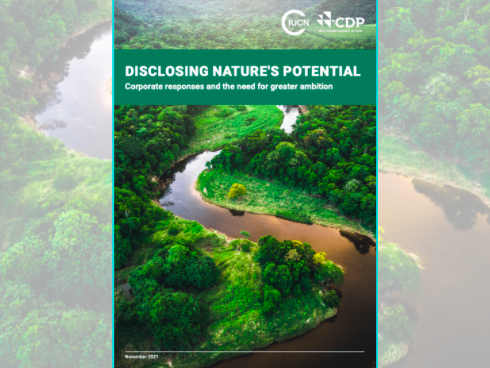
Submitted by hazal.bastimur on December 13, 2021
CDP and IUCN (International Union for Conservation of Nature and Natural Resources) published their joint report “Disclosing Nature's Potential: Corporate responses and the need for greater ambition” on November 5, 2021.
The interlinked climate and biodiversity crises are now posing increasing environmental, social, and economic risks to society. Businesses contribute substantially to these crises and are today under unprecedented pressure from different sources to take various measures to lower their environmental footprint. In this report, CDP and IUCN jointly analyze the extent to which companies reporting to the CDP are moving beyond climate, forest and water to consider wider risks, impacts, opportunities and responses to nature.
The role of businesses across different sectors of the global economy (agriculture, energy, transportation, industries, etc.) in contributing to these twin global challenges of climate change and biodiversity loss is well known and documented. CDP states that the point that should not be forgotten in this report is that there is great pressure on businesses around the world, especially those operating in the most environmentally damaging sectors -for example, fossil fuel-based power generation and industrial agriculture- to minimize their negative impacts. This pressure -which is emanating from multiple sources- including through government regulation, judicial sanctions, civil society activism, and investor and consumer action is now leading to companies taking a range of measures to address their environmental footprint. In the report, CDP encourages companies to adopt voluntary net-zero greenhouse gas emission targets and environmental positive targets, while encouraging participation in corporate green initiatives such as We Mean Business Coalition, Business for Nature, Race to Zero and more. The report states that companies themselves are increasingly feeling the negative effects of climate change and ecosystem degradation on their own operations and supply chains. The prominent idea in the report is as follows; “However, we also know that the vast majority of companies are still not treating climate change and other environmental risk factors as core business concerns”.
The CDP and IUCN point many striking findings in this report. One is that 68% of companies that publicly disclose risks identify climate and nature-related risks after identifying risks that could have a significant financial or strategic impact on their businesses. The report notes that of these 68%, the vast majority identify risks related to climate rather than risks related to nature.
Another prominent issue in the report is that disclosing companies report few nature-related opportunities. While the majority of companies do not see the potential benefits of working with the environment, only 22% of reporting companies identify opportunities related to climate and nature. 66% of these are climate related opportunities and 15% are nature related.
In the report, the rate of companies reporting that they are affected by climate and nature-related disasters seems to be 71%, and the majority of this comes from the climate crisis, as estimated. Researches show that only 6.5% reported harmful environmental effects, compared to 69% reporting climate-related harmful effects.
Another issue highlighted in the report is that companies rarely consider nature in their responses to environmental impact reporting. The research notes that among companies that reported how they responded to harmful effects, only 11% identified nature-related responses.
In the report “Disclosing Nature's Potential”, CDP illustrates some of the steps that some companies participating in reporting systems are currently taking to integrate nature into their operations through a series of case studies. The report reminds that while the main findings are welcomed, it is still too early to say to what extent they offer true Nature-Based Solutions (NbS) as defined and accepted by the IUCN and makes the following recommendations;
- Businesses should aim to identify and report on nature-related risks, opportunities, impacts and responses more systematically within their corporate environmental disclosures.
- More businesses need to take concrete steps now to put in place science-based nature-positive net-zero strategies.
- Businesses should implement their nature/NbS-related plans and actions based on the best available international standards and guidance, including by systematically applying the IUCN Global Standard for NbSTM.
- Governments can encourage greater action and ambition by businesses, both by establishing policies to ensure more stringent corporate environmental disclosures on nature, and by ensuring greater alignment across all nature-related policy processes.
Click here to access the full report.





